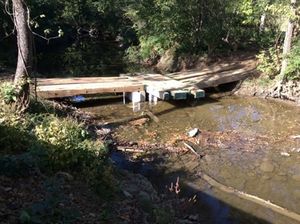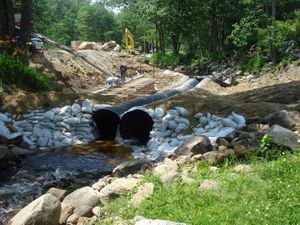
Difference between revisions of "Construction practices to minimize sediment discharge"
(Created page with "Erosion is the process by which soil, rock, or other material is moved from one location to another, typically through the action of water or wind. Erosion prevention practice...") |
PKalinosky (talk | contribs) m (→Related pages) |
||
| (12 intermediate revisions by one other user not shown) | |||
| Line 1: | Line 1: | ||
| − | + | [[File:Stream2.jpg|300px|thumb|alt=temp stream crossing image|<font size=3>Temporary wooden bridge crossing for short-term use over low-flow channel. (Source: Tetra Tech)</font size>]] | |
| + | [[File:Diversion 1.jpg|300px|thumb|alt=photo of diversion|<font size=3>In this example, a temporary diversion was installed using two corrugated plastic pipes to divert a stream and provide dry working conditions during the construction of a new bridge. (Source: Northpoint Engineering)</font size>]] | ||
| − | *[[Construction stormwater practices - temporary | + | Erosion is the process by which soil, rock, or other material is moved from one location to another, typically through the action of water or wind. Erosion prevention practices are designed to prevent or minimize erosion. |
| − | *[[Construction stormwater practices - diversion and working in the dry| | + | |
| − | *[[Construction stormwater treatment - | + | This page provides links to pages that provide information on practices not specifically considered erosion prevention or sediment control practices, but that are considered good construction practices. |
| + | |||
| + | [[Acknowledgements for construction stormwater|Acknowledgements]] | ||
| + | |||
| + | *[[Construction stormwater practices - temporary stream crossing]] | ||
| + | *[[Construction stormwater practices - diversion and working in the dry]] | ||
| + | *[[Construction stormwater treatment - dewatering, including chemical treatment and sediment filtration]] | ||
| + | *[[Construction stormwater treatment - BMP removal after final stabilization]] | ||
| + | |||
| + | ==Photo galleries== | ||
| + | *[http://stormwater.pca.state.mn.us/index.php/Construction_stormwater_photo_gallery_-_Stabilization Stabilization practices] | ||
| + | *[[Construction stormwater photo gallery - Perimeter control|Perimeter control]] | ||
| + | *[[Construction stormwater photo gallery - Vehicle tracking BMPs|Vehicle tracking BMPs]] | ||
| + | *[[Construction stormwater photo gallery - Outlet energy dissipation|Outlet energy dissipation]] | ||
| + | *[[Construction stormwater photo gallery - Check dams (ditch checks, ditch dikes)|Check dams (ditch checks, ditch dikes)]] | ||
| + | *[[Construction stormwater photo gallery - Storm drain inlet protection|Storm drain inlet protection]] | ||
| + | |||
| + | ==Links== | ||
| + | *[http://stormwater.pca.state.mn.us/index.php/Construction_stormwater_program Main construction stormwater page] | ||
| + | *[[Sediment control practices]] | ||
| + | *[[General principles for erosion prevention and sediment control at construction sites in Minnesota]] | ||
| + | *[[Construction stormwater best management practice – perimeter control fact sheet]] | ||
| + | *[https://www.pca.state.mn.us/sites/default/files/wq-strm2-68p.pdf Linear permanent stormwater management design flow chart] | ||
| + | *[[Construction stormwater best management practice – Constructing infiltration systems]] | ||
| + | *[[Construction stormwater best management practice – Concrete, paint, stucco and other washout guidance]] | ||
| + | *[https://www3.epa.gov/npdes/pubs/concretewashout.pdf EPA Concrete Washout Stormwater Best Management Practice] | ||
| + | *[[Construction stormwater best management practice – buffer zones]] | ||
| + | *[[Construction stormwater best management practice – Site stabilization]] | ||
| + | *[[Construction stormwater – Top 5 permit violations]] | ||
| + | |||
| + | ==Related pages== | ||
| + | *[[Erosion prevention practices]] - Links to a page that provides a portal to information on individual erosion prevention practices. | ||
| + | *[[Sediment control practices]] - Links to a page that provides a portal to information on individual sediment control practices. | ||
| + | *[[Construction stormwater treatment]] | ||
| + | *[[Construction practices to minimize sediment discharge]] | ||
| + | *[[Winter construction practices for site stabilization, erosion prevention and sediment control]] | ||
| + | *[[General principles for erosion prevention and sediment control at construction sites in Minnesota]] | ||
| + | *<font size=4>'''NEW!</font size> - '''[[10 Steps to Stormwater Pollution Prevention on Small Residential Construction Sites]]: An interactive image illustrating stormwater practices at small construction sites. | ||
| + | *[[Links for construction stormwater]] | ||
| + | *[[Construction stormwater inspection checklist wq-strm2-36|Construction stormwater inspection checklist]] | ||
| + | |||
| + | [[Category:Level 3 - Best management practices/Construction practices/Erosion prevention practices]] | ||
| + | [[Category:Level 3 - Best management practices/Construction practices/Sediment control practices]] | ||
Latest revision as of 19:23, 19 January 2024
Erosion is the process by which soil, rock, or other material is moved from one location to another, typically through the action of water or wind. Erosion prevention practices are designed to prevent or minimize erosion.
This page provides links to pages that provide information on practices not specifically considered erosion prevention or sediment control practices, but that are considered good construction practices.
- Construction stormwater practices - temporary stream crossing
- Construction stormwater practices - diversion and working in the dry
- Construction stormwater treatment - dewatering, including chemical treatment and sediment filtration
- Construction stormwater treatment - BMP removal after final stabilization
Photo galleries
- Stabilization practices
- Perimeter control
- Vehicle tracking BMPs
- Outlet energy dissipation
- Check dams (ditch checks, ditch dikes)
- Storm drain inlet protection
Links
- Main construction stormwater page
- Sediment control practices
- General principles for erosion prevention and sediment control at construction sites in Minnesota
- Construction stormwater best management practice – perimeter control fact sheet
- Linear permanent stormwater management design flow chart
- Construction stormwater best management practice – Constructing infiltration systems
- Construction stormwater best management practice – Concrete, paint, stucco and other washout guidance
- EPA Concrete Washout Stormwater Best Management Practice
- Construction stormwater best management practice – buffer zones
- Construction stormwater best management practice – Site stabilization
- Construction stormwater – Top 5 permit violations
Related pages
- Erosion prevention practices - Links to a page that provides a portal to information on individual erosion prevention practices.
- Sediment control practices - Links to a page that provides a portal to information on individual sediment control practices.
- Construction stormwater treatment
- Construction practices to minimize sediment discharge
- Winter construction practices for site stabilization, erosion prevention and sediment control
- General principles for erosion prevention and sediment control at construction sites in Minnesota
- NEW! - 10 Steps to Stormwater Pollution Prevention on Small Residential Construction Sites: An interactive image illustrating stormwater practices at small construction sites.
- Links for construction stormwater
- Construction stormwater inspection checklist
This page was last edited on 19 January 2024, at 19:23.

